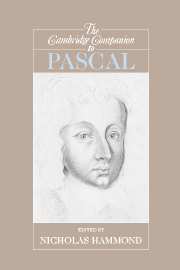Book contents
- Frontmatter
- Introduction
- 1 Pascal’s life and times
- 2 Pascal’s reading and the inheritance of Montaigne and Descartes
- 3 Pascal’s work on probability
- 4 Pascal and decision theory
- 5 Pascal’s physics
- 6 Pascal’s philosophy of science
- 7 Pascal’s theory of knowledge
- 8 Grace and religious belief in Pascal
- 9 Pascal and holy writ
- 10 Pascal’s Lettres provinciales
- 11 Pascal and the social world
- 12 Pascal and philosophical method
- 13 Pascal’s Pensées and the art of persuasion
- 14 The reception of Pascal’s Pensées in the seventeenth and eighteenth centuries
- Bibliography
- Index
12 - Pascal and philosophical method
Published online by Cambridge University Press: 28 May 2006
- Frontmatter
- Introduction
- 1 Pascal’s life and times
- 2 Pascal’s reading and the inheritance of Montaigne and Descartes
- 3 Pascal’s work on probability
- 4 Pascal and decision theory
- 5 Pascal’s physics
- 6 Pascal’s philosophy of science
- 7 Pascal’s theory of knowledge
- 8 Grace and religious belief in Pascal
- 9 Pascal and holy writ
- 10 Pascal’s Lettres provinciales
- 11 Pascal and the social world
- 12 Pascal and philosophical method
- 13 Pascal’s Pensées and the art of persuasion
- 14 The reception of Pascal’s Pensées in the seventeenth and eighteenth centuries
- Bibliography
- Index
Summary
The idea of a philosophical method is more commonly associated with Descartes than it is with Pascal. In his Discourse on the Method for Conducting One's Reason Well and for Seeking Truth in the Sciences, first published in 1637, Descartes asserts that, in order to be successful, the search for philosophical and scientific truths has to obey a fixed set of guidelines. In contrast, Pascal generally uses the term method ironically and pejoratively. In the Provincial Letters the various techniques used by the Jesuits to twist the precepts of conventional morality are often referred to as a method. In the Pensées, the word method is almost entirely absent. There exists one work, however, where Pascal uses the term in a non-pejorative way: a small, unfinished treatise written around 1655 and entitled Mathematical Mind (De l'esprit géométrique). In a bold claim reminiscent of Descartes' Discourse on Method, Pascal presents the treatise as 'the method for mathematical [i.e., methodical and perfect] demonstrations' (OC i i , 155). More generally, he presents mathematical reasoning as the model that one should emulate in every intellectual activity. A study of Pascal's philosophical method must thus begin with an analysis of Mathematical Mind.
- Type
- Chapter
- Information
- The Cambridge Companion to Pascal , pp. 216 - 234Publisher: Cambridge University PressPrint publication year: 2003
- 5
- Cited by

